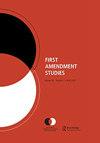Perspective by incongruity: Law and rhetoric in Masterpiece Cakeshop v. Colorado Civil Rights Commission
Q2 Social Sciences
引用次数: 1
Abstract
ABSTRACT The Supreme Court’s ruling in Masterpiece Cakeshop v. Colorado Civil Rights Commission was decided on the narrow ground that the Colorado Civil Rights Commission violated the First Amendment’s Free Exercise Clause because of hostility toward the owner of Masterpiece Cakeshop. This decision failed to answer a cardinal question of constitutional law, whether or not the First Amendment’s Free Speech Clause could undermine nondiscrimination law. In Justice Anthony Kennedy’s majority opinion, he seized on one particular comment made by a Commissioner about religious freedom that justified ruling against the Commission for its use of discriminatory rhetoric. According to Justice Kennedy, the Commission violated the Free Exercise Clause by describing religious expression as despicable and as merely rhetorical. In this report, I argue that Justice Kennedy’s opinion demands heightened attention for two reasons. First, to describe religious freedom as a justification for prejudice as merely rhetorical is a gross underestimation of the power of rhetoric and provides moral encouragement to anti-LGBTQ+ activists using the legal system to advance a heteronormative agenda. Second, Justice Kennedy’s claim that rhetoric is insubstantial and insincere calls into question the role of the Court, the meaning of the law, and the relationship between the law and rhetoric.不协调视角:杰作蛋糕店诉科罗拉多州民权委员会案中的法律与修辞
摘要最高法院在Masterpiece Cakeshop诉科罗拉多州民权委员会一案中的裁决是基于狭隘的理由作出的,即科罗拉多州民权委员会因对MasterpieceCakeshoP所有者的敌意而违反了第一修正案的自由行使条款。这一决定未能回答宪法的一个基本问题,即第一修正案的言论自由条款是否会破坏非歧视法。在大法官安东尼·肯尼迪的多数意见中,他抓住了一位专员关于宗教自由的特别评论,该评论为反对委员会使用歧视性言论的裁决提供了理由。根据肯尼迪大法官的说法,委员会违反了自由行使条款,将宗教言论描述为卑鄙和仅仅是修辞。在这份报告中,我认为肯尼迪大法官的意见需要得到高度关注,原因有两个。首先,将宗教自由描述为偏见的正当理由,仅仅是修辞,这严重低估了修辞的力量,并为反LGBTQ+活动家利用法律制度推进非规范议程提供了道德鼓励。其次,肯尼迪大法官声称修辞是空洞和不真诚的,这让人对法院的作用、法律的意义以及法律与修辞之间的关系产生了疑问。
本文章由计算机程序翻译,如有差异,请以英文原文为准。
求助全文
约1分钟内获得全文
求助全文
来源期刊

First Amendment Studies
Social Sciences-Law
自引率
0.00%
发文量
0
期刊介绍:
First Amendment Studies publishes original scholarship on all aspects of free speech and embraces the full range of critical, historical, empirical, and descriptive methodologies. First Amendment Studies welcomes scholarship addressing areas including but not limited to: • doctrinal analysis of international and national free speech law and legislation • rhetorical analysis of cases and judicial rhetoric • theoretical and cultural issues related to free speech • the role of free speech in a wide variety of contexts (e.g., organizations, popular culture, traditional and new media).
 求助内容:
求助内容: 应助结果提醒方式:
应助结果提醒方式:


